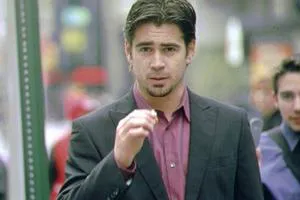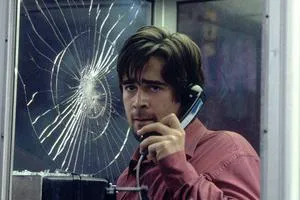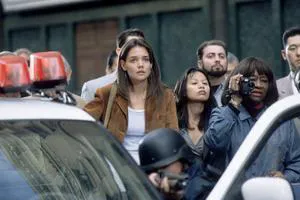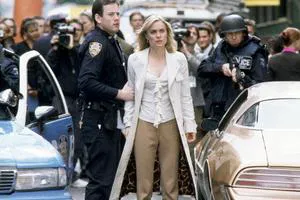Phone Booth: A Taut Thriller with a Moral Compass
“'“Phone Booth” is what “In Motion” could have been if Filipp Yankovsky had managed to express what he wanted,”’ a friend remarked, eliciting envy with his precise formulation. Veteran director Joel Schumacher (“The Client,” “Falling Down”) largely succeeds, despite some evident challenges. While the script leans towards theatricality, the moral is somewhat worn, and the premise feels a tad dated, the execution is solid, resonating well in both America and Europe – a feat not always achieved.

New York City boasts three hundred phone booths, one of which stands on Broadway. One morning, a slick, well-dressed guy strolls down this street, a young secretary to his left and a cell phone in his right hand. Various aspiring artists, comedians, and other small-time talents he promotes through TV and newspapers call him on his cell. The secretary is constantly impressed by her boss’s coolness. They reach the booth, where a pizza delivery guy accosts the “cool” guy, claiming someone sent him a pizza as a gift. The cool guy dismisses the delivery guy, then, as usual, removes his wedding ring and calls his unmarried lover. He flirts with her, promises her the world, and arranges a meeting at a nearby hotel. As he’s about to head there, the phone in the booth rings. Abroad, this is possible. A stranger’s voice reveals a wealth of intimate details about his life and habits, including the fact that he lies about everything, and concludes by saying that he will be killed today if he leaves the booth. To make matters worse, a cheap prostitute from a nearby street corner needs to make a call. The cool guy won’t come out, she’s desperate to use the phone, and eventually, her pimp gets shot. The phone booth maniac, of course, is responsible, and that’s where the story takes off.

More Than Just a Thriller
The story has two primary strengths. First, it’s not what it seems. It appears to be a police thriller that keeps you on the edge of your seat, but it’s actually a moral lesson delivered with subtlety. The allegory unequivocally, consistently, and thoroughly demonstrates that if a man is a liar, neither a lone maniac nor the entire New York police force can force him to tell the truth. He won’t succumb to blackmail or threats, and even when everything is clear to everyone, even when his wife, a thousand mistresses, or even all the passersby are shot, and he himself is held at gunpoint, he still won’t lose hope of wriggling out of it, as usual. Of course, in the film, he eventually tells the truth, but that’s the magic of cinema – to sow illusions. Nevertheless, the film presents its argument with highly relevant and original points. It touches on show business, the importance of appearances, easy money, and the deception prevalent today – all things that happen far beyond just New York.
The second strength of the drama is its rare pace, with the entire film, packed with twists and turns, clocking in at just one hour and fifteen minutes. Anyone who arrives fifteen minutes late will be completely lost, regardless of their IQ. The rest simply don’t have time to get bored, even if they dislike moralizing. Even the most jaded critic can endure seventy-five minutes without feeling weighed down.

Performances and Directorial Flair
Colin Farrell (“Daredevil”) convincingly portrays a complete scoundrel. Perhaps only the revered Forest Whitaker (“Ghost Dog: The Way of the Samurai”), “good” in everything – acting, directing, and producing – can be seen as his real-life counterpart. In the role of the unfortunate police captain, he also provides a good dose of humor to the thriller. Spotting Kiefer Sutherland for a minute is an added pleasure. All of them are seasoned professionals. But Schumacher somehow covers them with direction, so that it works, and doesn’t stick out. In terms of visuals, he incorporates equally relevant computer effects, perfectly distinguishing the realistic “Phone Booth” from his earlier “Batman Forever.” The effects here are to add a little more tension: multi-screen, solarized shots, a kind of grainy TV reportage. In short, everything is filmed for television and computer, and the eye races across the screen at today’s speeds. This edginess really resembles real cinema.

Of course, it lacks an answer as to why, in fact, 299 out of 300 men today are hopelessly lying, but the film turned out to be entertaining and sarcastic.